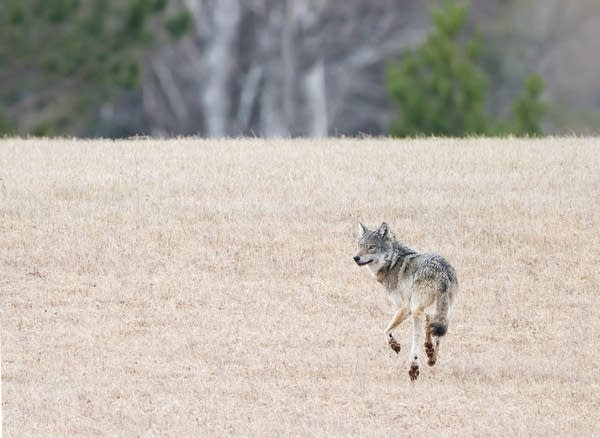Judge bars dogs from Wisconsin wolf hunt
Go Deeper.
Create an account or log in to save stories.
Like this?
Thanks for liking this story! We have added it to a list of your favorite stories.

By TODD RICHMOND
Associated Press
MADISON, Wis. (AP) — A Dane County judge issued an order Friday that temporarily bans wolf hunters from training or using dogs in the chase, casting doubt on whether this fall's hunt will happen.
Judge Peter C. Anderson's order comes as part of a lawsuit that a group of humane societies brought against the state Department of Natural Resources. The group contends the agency failed to impose any restrictions on dog training and dog use when it set up this fall's new wolf hunt, creating the possibility of bloody fights that would violate Wisconsin's animal cruelty statutes.
"He's bringing some sanity to the DNR," said humane societies' attorney Carl Sinderbrand after the ruling.
Turn Up Your Support
MPR News helps you turn down the noise and build shared understanding. Turn up your support for this public resource and keep trusted journalism accessible to all.
The DNR issued a statement Thursday saying prohibiting dogs would effectively end the hunt. Department officials said they wouldn't have time to revise their regulation to reflect the ban before the season starts in mid-October.
They softened their stance Friday, saying they'll do everything they can to make the hunt happen. DNR attorney Tim Andryk said Friday in a telephone interview that the agency issued the warning because the law establishing the wolf hunt allows the use of dogs, and department attorneys believed the only way they could abide by the injunction would be to not issue any permits.
But Anderson said the hunt could go on, just not with dogs, and he is set to take up a DNR motion to dismiss the case Sept 14. The last day for permit applications was supposed to be Friday, but in light of all the confusion, the agency decided Friday evening to extend the deadline by a week. More than 18,000 people had applied as of Friday afternoon.
"It's not 100 percent clear," Andryk said. "It won't be resolved until the case is final."
President Barack Obama's administration removed wolves in Minnesota, Wisconsin and Michigan from the endangered species list in January. Wisconsin Republicans pushed through a law this spring that allows hunters to trap and shoot wolves.
The legislation also made Wisconsin the first state to allow hunters to use dogs in wolf hunting, but didn't impose leash requirements or establish dog training parameters.
The first season is scheduled to begin Oct. 15 and run through the end of February. DNR rules enacting the hunt call for a total statewide quota of 201 wolves. The state's Chippewa tribes have exclusive right to 85 of them, leaving 116 for non-tribal hunters. The agency plans to issue 1,160 permits, or 10 percent of the general public's quota, through a lottery.
The hunt has become a flashpoint of controversy for animal lovers, who fear Wisconsin's wolf population hasn't recovered enough to sustain a hunt. The fight spilled over into court in early August when the humane societies filed the lawsuit.
The humane societies want Anderson to permanently block the use of dogs in the hunt.
"We're going to have a body count here," Sinderbrand told Anderson on Friday. "We're going to have carnage."
DNR attorneys have argued both that they had the discretion to leave out dog requirements and that they didn't have authority to impose any, opposing positions that left Anderson puzzled.
In a nearly two-hour explanation, the judge said he was skeptical about claims of carnage, but said the humane societies had shown the lack of restrictions could lead to more animal fights.
"A chance of a vicious attack," Anderson said, "is quite high and absent regulation it will be hard for hunters to know what to do (to prevent them)."



